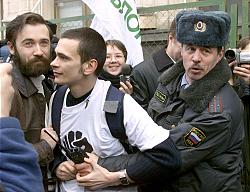 |
|
Adlan Khasanov / Reuters
Police breaking up
a rally protesting the planned restrictions on demonstrations outside
the Duma building on Wednesday morning. Two Yabloko members were detained.
|
As the United Russia majority in the State Duma gave preliminary approval
to a bill outlawing protests near government buildings Wednesday, pro-democracy
activists staged a rally outside the Duma's main entrance to insist on
their right to do just that.
The bill bans rallies and demonstrations outside presidential residences
and buildings occupied by federal, regional or local authorities, as well
as foreign embassies and offices of international organizations.
Critics called it a move to distance legislators from the people they
represent and a giant setback to civil rights. Its pro-Kremlin sponsors
called the legislation a logical step in the fight against terrorism and
said it was meant to protect citizens' safety.
Deputy Justice Minister Yevgeny Sidorenko told deputies that the bill,
drafted by his ministry and submitted in April 2003, should not be seen
as a threat to democracy. "It is much more democratic than the Soviet-era
one it replaces," he was quoted by Interfax as saying.
Demonstrations are currently governed by a decree first issued by the
Supreme Soviet in 1988 and reaffirmed, with minor modifications, by presidential
decrees in 1992 and 1993.
Duma Security Committee chairman Vladimir Vasilyev, a United Russia
deputy, said the bill protects the safety of citizens. "There are
worries that this bill is repressive, but it's not -- the biggest penalty
is a fine," he said. The maximum fine would be 10,000 rubles ($350).
Vladimir Slivyak, the co-chairman of the Ecodefense environment group
who was part of the morning picket, discounted Vasilyev's remarks in a
telephone interview. "Every country that wants to crack down on democracy
uses security as an excuse," he said.
Vasilyev said activists should not be concerned if their events are
relegated to places far removed from government buildings because the
media will make sure that their message is carried to the authorities.
The bill passed with 294 votes in favor, almost exclusively from United
Russia, and 137 opposed, but not before critics from minority parties
spoke out against it.
Deputy Sergei Popov, of
Yabloko, argued to his colleagues in remarks carried on television that
thousands of people went to the street to help bring down the Soviet Union,
and with this proposed law, that kind of demonstration would be forbidden.
"This is a mockery of the rights and freedoms that are written
into the Constitution," Communist Deputy Viktor Tyulkin said during
the debate. "Why don't they go ahead and forbid people from having
conversations?"
Rodina Deputy Oleg Shein decried the "psychological pressure"
such a restriction would put on labor unions. He said it would keep workers
from rallying against management.
"The government wants to insulate itself from protests by unhappy
citizens and ignore what real people have to say," Liberal Democratic
Party Deputy Alexei Ostrovsky said.
A group of 20 to 30 protesters led by Yabloko and Ecodefense carried
banners reading "No to a Police State!" and "Respect the
Constitution!" on the sidewalk outside the Duma building Wednesday
morning. Police dispersed the crowd after about 25 minutes, citing their
failure to notify officials as required.
Yabloko leader Sergei Mitrokhin
and a colleague were piled into a police car before a dozen television
cameras. They were released late in the afternoon.
Mitrokhin said by cellphone that the bill's limitations on civil rights
would put Russia on par with "Third World authoritarian regimes."
Besides government buildings, the new restrictions would apply to major
roads, pipelines, railroads and environmentally hazardous industrial sites.
Also blacklisted would be cultural venues, stadiums, hospitals, schools,
kindergartens and religious centers, among others.
Under current legislation, groups wishing to demonstrate must notify
authorities of their plans in advance but are free to meet where they
wish. The new legislation gives authorities the right to assign the location.
"The decision of where to hold a protest, who holds it, and how
it's held would belong not to citizens themselves but to the state organs,"
said Viktor Pokhmelkin, an independent deputy.
Bureaucrats would be able to make the process of getting permission
extremely difficult and complicated, he added. "It's a conscious
attempt to alienate the people from government decision-making."
Ecodefense's Slivyak complained, "To be completely obedient, you'd
have to hold your protest in the forest where no one can see it.
Ecodefense said in a statement that it would deliberately disobey the
law, if passed, and hold protests everywhere they are forbidden, to demonstrate
their opposition to restrictions on freedom of expression.
In 2001, Ecodefense successfully lobbied the Duma into postponing consideration
of a bill on importing processed nuclear fuel by holding a picket outside
the parliament. The bill, strongly opposed by Yabloko, was later rejected
in one of the party's rare legislative victories.
"There's very little democracy left in the country right now,"
Slivyak said. "Politicians from United Russia are looking to liquidate
democratic norms. They like bureaucracy, not democracy."
Greenpeace issued a statement accusing deputies of "becoming the
main violators of their constituents' rights." It also warned that
a section of the bill giving authorities the right reject requests for
protests that "contradict moral norms" could be abused due to
its vague language.
It is possible that some wording may be amended or changed as the bill
is prepared for a second reading. United Russia Deputy Andrei Isayev conceded
Wednesday that it was "no masterpiece."
The bill -- officially called the law on gatherings, meetings, demonstrations,
processions and pickets -- is expected to come up for a second hearing
by the end of April.
After a third reading, it needs to be approved by the Federation Council
before it can be signed into law by President Vladimir Putin.
Mitrokhin said he had little doubt that the legislation would pass.
"If and when it does, we will appeal to the Constitutional Court,"
he said.
See also:
the original at
www.themoscowtimes.com
Freedom of
Speech and Media Law in Russia
|